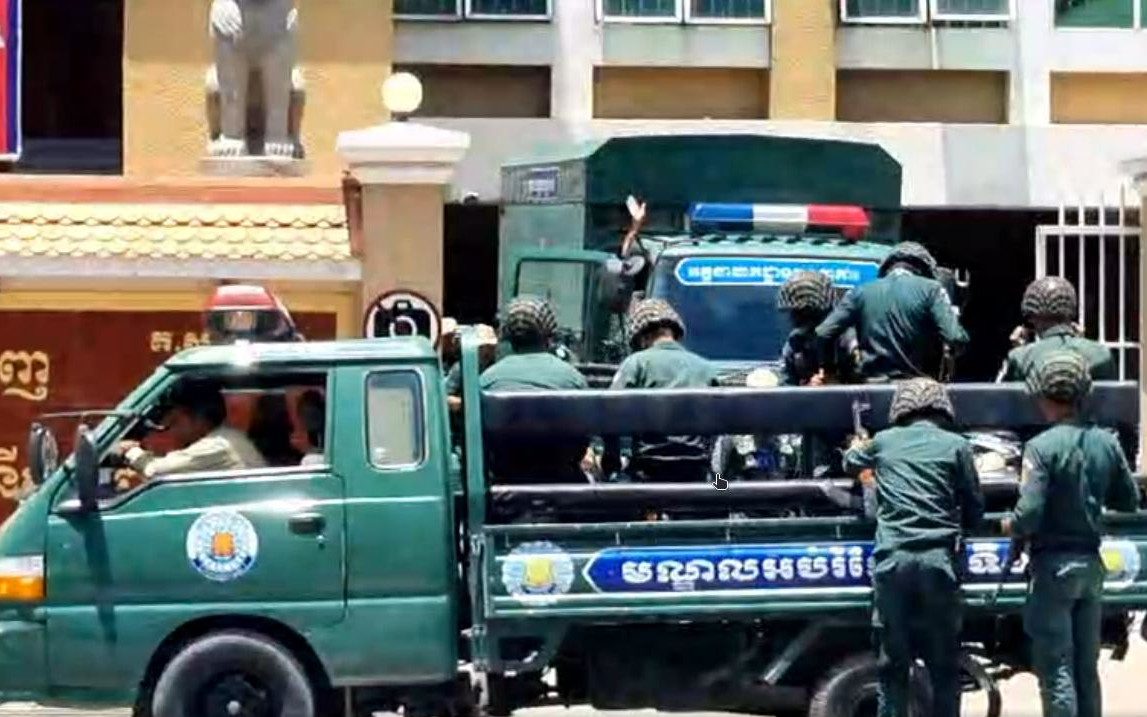Facebook posts by senior CNRP leaders and secret phone taps formed the basis for investigations into the fifth mass trial against the political opposition, where the court is debating activities linked to Mu Sochua’s unsuccessful return in 2021.
The Phnom Penh Municipal Court started a new trial on Thursday, this time into the events leading up to Sochua’s attempt to return from overseas to attend an early 2021 mass trial where she was a defendant. The latest trial involves 37 people — senior party leaders, former lawmakers, activists and supporters — but the court announced that two other individuals were part of the case and would be tried separately.
The other two are former CNRP activists Ir Channa, in detention on separate charges, and Sao Osaphea. Only three defendants were present in court: Khan Bunpheng, Voeung Samnang and Kong Mas, who are already imprisoned or being detained by the court.
Judge Ouk Reth Kunthea kicked off the trial by reading out an official report from the case file. One of the conclusions in the report read, “This is a plan with ill-intentioned tricks and an excuse to topple the legitimate government through inciting people to gather and incite people to get angry with the government.”
The case file also included several Facebook posts from party leaders Sam Rainsy, Eng Chhai Eang, Long Ry, Sochua and South Korea-based activist Sot Silat. The posts were about Sochua’s planned return on January 4, 2021, and criticism of Prime Minister Hun Sen. A few posts also related to Rainsy’s 2019 return attempt, which was already the basis for the first four mass trials.
Prosecutor Seng Heang then questioned Kong Mas for the rest of the morning, and asked about CNRP announcements overseas, whether he was connected to Silat in South Korea and if he knew about Sochua’s plans.
“Did you get any order from Mu Sochua?” Heang asked.
Kong Mas replied, “I did not care about that. I did not know and did not pay attention. I did not have time to think about this.”
Then Heang revealed that the court had four secret recordings of phone calls made by Mas to four different individuals: “Vuth,” “Chea Sok Kheng,” “Chan” and “Y Siet.”
In an alleged conversation with “Vuth” read out by Heang, Mas said, “Yesterday, I had a meeting with Aunty Mu Sochua. She asked to go and encourage her.”
Speaking to “Chan,” Mas allegedly talked about increasing the number of people who would go to welcome Sochua and that the “boss” would cover the costs of bringing in people from the provinces.
Judge Reth Kunthea also said Mas had told an investigating judge that he had brought 10 to 15 people from Svay Rieng to the Phnom Penh court near Olympic Stadium in case Sochua returned for the trial.
However, Mas said on Thursday that he had come to monitor a trial alone, though he did not make clear which trial. He added that he had no intention to create a movement against the government.
“I am regretful that the government always sees me as bad, but the important thing [for me] is giving happiness to people,” he said.
Mas asserted that he had not done anything against the law and Cambodians were allowed to move around the country; the same applied for people from the provinces.
However, judge Reth Kunthea challenged him on this point.
“Does the law state that you have to come and deploy at a place with 10 people at this place and with 20 people at that place?” Reth Kunthea queried.
“Is there any law that says participation [in a court hearing] means one is guilty of plotting?” Mas replied.
The trial is scheduled to continue on September 22.













